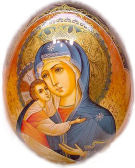Catholic Activity: Alleluia Egg

A description of the Easter egg symbolism and history, with the story of Monsignor Hellriegel's family tradition of the "Alleluia egg" or "golden egg."
DIRECTIONS
There have been many explanations of the custom of giving colored eggs at Easter. Each seems to have a germ of truth. A very practical soul has written that, since eggs were forbidden during Lent, they were colored red to symbolize Easter joy, and brought to the table. Others say that the egg is a symbol of new life connected with the baptismal feast of the Church. As new life is given the Christian in baptism, a new egg is given as a gift memorial. Some think the Easter egg is quite pagan in its origin, and heralds the return of spring.
The best description I have found was written by George Mardikian in Dinner at Omar Khayyam's. As he argues, the egg has always been a symbol of the universe in the lore of pagan peoples. Eggs were offered to their gods as a sign of fealty. The shell of the egg represented the sky. The membrane was the air. The white of the egg stood for the waters, and the yolk was the earth. Early Easter eggs were painted red to show that the salvation of the whole world was bought with the blood of Christ. The whole universe has been redeemed under the blood of Christ. As time went on, liturgical symbols were added to the decoration, and then secularism painted them with Barney Google and Superman.
Christine and Kathy can pop the eggs in the dye pots even though it is a little hard on the eggs and the table. Freddie can do the larger blends of color; Mary and Ann do the finer decorations. Among all the bright colors, one egg is left white and scrolled in gold. On its side "Alleluia" is shining. As father hides the eggs, each little painter hopes to find the "Alleluia" because it means a prize of cake or sweets. One year the "Alleluia" was not found until eight months later. I was cultivating the saxifrage in the garden and there was the golden egg. Needless to say, I cashed in even though the egg was slightly "agey."
One evening, Monsignor Hellriegel was describing the finding of the "Alleluia" egg in his family. The story was becoming more and more dramatic as his ten brothers and sisters were closing in on the hunt. Finally, by sheer good luck, he spied the gleam of gilt and he knew the prize was his. A little boy in the audience had been jumping to his feet as the story progressed. Now his hand was waving. He would have the floor. "Please, Father," he interrupted, "and what was the prize?" That was the important point — for a little boy — and Monsignor had failed to describe the prize. All of his eloquence now went into the description. The prize was a luscious German sweet cake, large enough to last any little boy a week or so. It was covered with cinnamon and sugar and nuts and the center sometimes had a Stollen filling. Your egg hunt will be full of enthusiasm if you bake an Easter sweet bread for the prize.
Activity Source: Cooking for Christ by Florence Berger, National Catholic Rural Life Conference, 4625 Beaver Avenue, Des Moines, IA 50310, 1949, 1999






